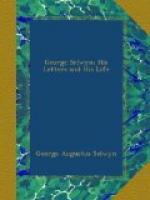(1781, Nov.?) 27 (26?), Monday night.—Storer came to town this morning, as he proposes to tell you to-night; he dined with me. I met him first in the street, as I was returning from Lincoln’s Inn. He had been, as he was engaged to do, to Lord Loughborough, to whom he had made a promise of going on his arrival. Neither the air or the bonne chere of the Castle have (has) done him any harm; il a bonne mine. He has left me to go to Brooks’s, and perhaps to the Cockpit(177); but as that is a compliment to the Minister rather than as a support of Government, he shewed no great empressement; nor could I inspire him with a zeal which I have not myself. I am not a solicitor of any future benefit from those who are in power, and when I require no more than common civility, they must not be surprised, if I [do] not pay what I do not receive.
We have had a blow, for the cause is a common (one). This surrender of Lord Cornwallis (178) seems to have put le comble a nos disgraces. What has been said about it, either at White’s or parmi les Grenouilles at Brooks’s, I know not.(179) I have not been out but for an hour before dinner to Mr. Woodcock. I received the first news of this yesterday from Williams, who dined with me, but you may be sure it was a subject he did not like to dwell upon, and I chose to talk with him rather of old than of modern times, because of them we may be agreed; of the present, whatever we think, we should talk and differ in discourse widely.
This evening I have had your letter of the 20th. I am diverted with your account of my two Irish friends. They are so completely of that cast, that I cannot but imagine that they meant to be of your side. Richards was sent away quickly for that purpose by my Lord Chamberlain, as my Lord told me. The other I have but a slight acquaintance with. I only guessed, as he desired a letter of introduction to you, that he meant to profess, by that, attachment. I had no doubt that in neither the one (n)or the other it was disinterested, but I own that I was so far their dupe that I imagined that they would not begin with opposition. Kingsman[’s] proposal of being your private Secretary, without a previous acquaintance, seems to be an idea quite new; what crotchet the Beau Richard has got in his head the Lord knows.
Storer has drawn to me a very pleasing picture of your present situation, satisfaction, and domestic felicity. All that gives me pleasure enough, as you may imagine; but when he talks to me of the length of time that you may stay, and the probability of it, I am au desespoir. I see myself deprived of my best resource for the passing of my life agreeably, when the greatest part of it is already gone. If I dwelt on this long I should be desole. I will there (fore) endeavour to think only of what is a consolation to me, that you are all well—en bonne odeur—that it is the beginning perhaps of a very career—that I may see some part of it—that I have little George here from time to time, and the pleasure of looking after him, and as I hope to your and to Lady Carlisle’s satisfaction. You think, I am afraid, that I nurse him too much. . . .




